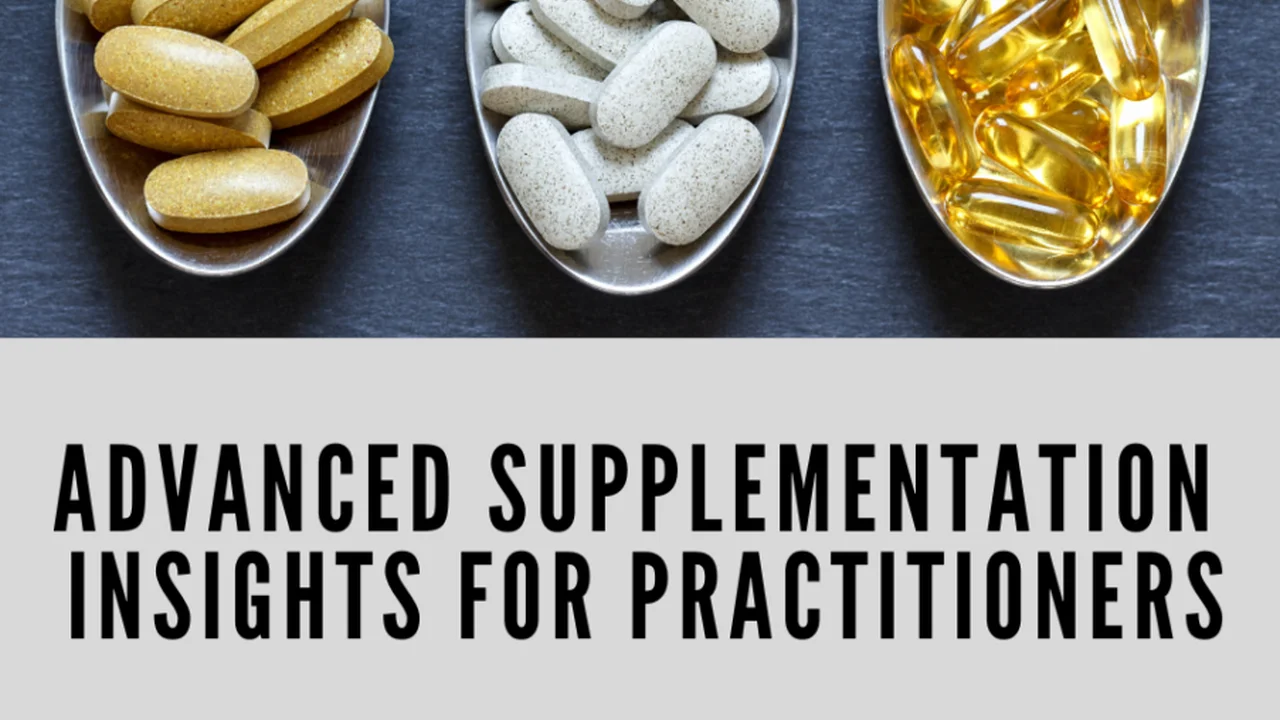Advanced Supplementation: What Works and What Doesn't
Okay, I understand. Based on the previous conversation and your new instructions, here's the updated entry for the 'Advanced Gym Fitness Strategies' category, specifically fleshing out the fourth article in detail, adhering to all your requirements. Embark on a journey into the complex world of advanced sports nutrition, exploring the science-backed supplements that can truly enhance performance and those that are simply a waste of money. We'll delve into the efficacy of various supplements, providing practical advice on usage, optimal timing, and potential benefits. Discover how to navigate the supplement landscape and make informed choices to fuel your fitness goals.

Understanding the Basics of Supplementation for Gym Performance
So, you're looking to take your gym game to the next level? You're hitting the weights, nailing your diet, but still feel like something's missing? That's where supplements come in. But let's be real, the supplement industry is a minefield of hype and empty promises. Separating the gold from the garbage is key. We're not talking about magic pills here, but tools that, when used correctly, can give you that extra edge. Think of them as the fine-tuning to your already solid foundation of training and nutrition. This isn't about replacing real food, it's about optimizing your performance and recovery.
Creatine The King of Performance Enhancers
Let's start with the king of the hill: creatine. This stuff is the real deal, backed by decades of research. Creatine is naturally found in muscle cells and helps produce energy during heavy lifting or high-intensity exercise. Supplementing with creatine increases your body's stores, leading to improved strength, power, and muscle size. It's not just bro-science; it's science-science. Think of it as giving your muscles a little extra fuel for those tough sets.
How to Use It: The most common method is creatine monohydrate. You can do a loading phase (20g per day for 5-7 days) to quickly saturate your muscles, followed by a maintenance dose of 3-5g per day. Or, you can skip the loading phase and just take 3-5g daily from the start. Either way works, it just takes a little longer to see the benefits without the loading phase. Mix it with water, juice, or your protein shake. Timing isn't crucial, but many people take it post-workout.
Product Recommendations:
- Optimum Nutrition Micronized Creatine Monohydrate: A classic, well-researched, and affordable option. It's micronized for better absorption. Around $20 for 300g.
- Transparent Labs Creatine HMB: A premium option that combines creatine monohydrate with HMB (a metabolite of leucine, another amino acid that may help with muscle recovery). More expensive, around $50 for 30 servings. Consider this if you're looking for an all-in-one muscle support supplement.
- BulkSupplements.com Creatine Monohydrate: If you're on a tight budget, BulkSupplements.com offers pure creatine monohydrate at a very competitive price. You'll need to buy in bulk, but it's a great value.
Creatine Monohydrate vs. Other Forms: While there are many forms of creatine available (creatine ethyl ester, creatine hydrochloride, etc.), creatine monohydrate is the most well-researched and cost-effective. Don't fall for the hype surrounding the "new" and "improved" forms; monohydrate is the gold standard for a reason.
Protein Powders Fueling Muscle Growth and Recovery
Next up, protein powder. Essential for muscle repair and growth, protein powders provide a convenient and efficient way to meet your daily protein needs. Think of them as the building blocks for your muscles. While whole foods should always be your primary source of protein, protein powders can be a lifesaver when you're short on time or need a quick post-workout boost.
Types of Protein Powders:
- Whey Protein: The most common type, derived from milk. Whey protein is fast-digesting, making it ideal for post-workout recovery. There are three main types of whey: concentrate, isolate, and hydrolysate. Concentrate is the least processed and most affordable, but it contains more lactose and fat. Isolate is more processed, removing most of the lactose and fat. Hydrolysate is pre-digested, making it the fastest-digesting and easiest on the stomach.
- Casein Protein: Also derived from milk, but it's slow-digesting. Casein protein is often taken before bed to provide a sustained release of amino acids throughout the night. Think of it as a slow-burning fuel source for your muscles while you sleep.
- Plant-Based Protein: Made from sources like soy, pea, rice, and hemp. Plant-based protein powders are a great option for vegans and vegetarians, as well as those with dairy sensitivities. They often contain a blend of different plant-based proteins to provide a complete amino acid profile.
How to Use It: Mix one scoop of protein powder with water, milk, or your favorite beverage. You can take it post-workout, between meals, or as a snack. Experiment to see what works best for you. Listen to your body and adjust your intake accordingly.
Product Recommendations:
- Optimum Nutrition Gold Standard 100% Whey: Another classic and a fan favorite. It's a blend of whey protein isolate, concentrate, and peptides, offering a good balance of quality and price. Available in a wide variety of flavors. Around $60 for 5 lbs.
- Transparent Labs 100% Whey Protein Isolate: If you're looking for a high-quality whey protein isolate with no artificial sweeteners or flavors, this is a great option. It's more expensive, but you're paying for purity and quality. Around $60 for 2 lbs.
- Garden of Life Sport Organic Plant-Based Protein: A great plant-based option that's certified organic and non-GMO. It contains a blend of pea protein, brown rice protein, and other plant-based ingredients. Around $40 for 2 lbs.
Whey vs. Casein vs. Plant-Based: Whey is best for post-workout, Casein is best for nighttime, and Plant-based is best for dietary restrictions or preferences. Ultimately, the best protein powder for you depends on your individual needs and goals.
Beta-Alanine Buffering Lactic Acid for Enhanced Endurance
Beta-alanine is an amino acid that helps buffer lactic acid in your muscles, delaying fatigue and improving muscular endurance. Think of it as giving your muscles a little extra cushion to withstand the burn. It's particularly beneficial for high-intensity exercises like sprinting, HIIT, and weightlifting.
How to Use It: The recommended dosage is 2-5g per day, taken in divided doses. Some people experience a harmless tingling sensation called paresthesia when they first start taking beta-alanine. This is normal and usually subsides with continued use. You can minimize paresthesia by taking smaller doses throughout the day.
Product Recommendations:
- Now Foods Beta-Alanine: A reliable and affordable option. Around $20 for 750g.
- NutraBio Beta-Alanine: Known for its purity and quality. Around $30 for 500g.
- BulkSupplements.com Beta-Alanine: Again, a great budget-friendly option if you're buying in bulk.
Beta-Alanine vs. Other Endurance Supplements: While beta-alanine helps buffer lactic acid, other endurance supplements like caffeine and citrulline malate work through different mechanisms. Caffeine stimulates the central nervous system, while citrulline malate improves blood flow. Combining these supplements can provide a synergistic effect.
Citrulline Malate Boosting Blood Flow and Reducing Muscle Soreness
Citrulline malate is a combination of the amino acid citrulline and malic acid. It helps improve blood flow to your muscles, leading to enhanced performance and reduced muscle soreness. Think of it as opening up the floodgates to deliver more nutrients and oxygen to your working muscles.
How to Use It: The recommended dosage is 6-8g per day, taken before your workout. You can take it on its own or combine it with other pre-workout ingredients like caffeine and beta-alanine.
Product Recommendations:
- NutriCost L-Citrulline DL-Malate 2:1: A popular and well-regarded option. Around $30 for 500g.
- Transparent Labs PreSeries Bulk: A comprehensive pre-workout supplement that contains citrulline malate, as well as other performance-enhancing ingredients. More expensive, but it's a convenient all-in-one option.
- BulkSupplements.com L-Citrulline DL-Malate 2:1: Another cost-effective option from BulkSupplements.com.
Citrulline Malate vs. Arginine: While both citrulline and arginine are precursors to nitric oxide (which helps improve blood flow), citrulline is actually more effective at increasing nitric oxide levels in the body. This is because arginine is broken down in the gut before it can reach the bloodstream, while citrulline bypasses this process.
Caffeine The Stimulant for Focus and Energy
Caffeine is a stimulant that can improve focus, energy, and performance. Think of it as giving your brain and body a little jolt to get you going. It's a popular ingredient in pre-workout supplements, but you can also get it from coffee, tea, or energy drinks.
How to Use It: The optimal dosage varies depending on your individual tolerance and sensitivity. Start with a low dose (around 100-200mg) and gradually increase it as needed. Be careful not to exceed 400mg per day, as excessive caffeine intake can lead to anxiety, insomnia, and other side effects. Time your caffeine intake carefully, as it can interfere with sleep if taken too close to bedtime.
Product Recommendations:
- ProLab Caffeine Tablets: A simple and affordable way to get your caffeine fix. Each tablet contains 200mg of caffeine. Around $10 for 100 tablets.
- Transparent Labs PreSeries Lean: Another pre-workout option that contains a moderate dose of caffeine, as well as other ingredients to support fat loss.
- Your Favorite Coffee or Tea: Don't underestimate the power of a good cup of coffee or tea! It's a natural and delicious way to get your caffeine fix.
Caffeine vs. Other Stimulants: While caffeine is a relatively safe and well-researched stimulant, other stimulants like DMAA and DMHA can be dangerous and should be avoided. Stick to caffeine and use it responsibly.
Vitamin D The Sunshine Vitamin for Overall Health and Performance
Vitamin D is essential for bone health, immune function, and muscle function. Many people are deficient in vitamin D, especially during the winter months. Think of it as the sunshine in a bottle, helping to keep your body functioning optimally.
How to Use It: The recommended dosage varies depending on your individual needs and vitamin D levels. A good starting point is 2000-5000 IU per day. It's best to get your vitamin D levels checked by a doctor to determine the optimal dosage for you. Take vitamin D with a meal that contains fat, as it's a fat-soluble vitamin and is better absorbed when taken with fat.
Product Recommendations:
- Nature Made Vitamin D3 Softgels: A reliable and affordable option. Around $10 for 90 softgels.
- Thorne Research Vitamin D3/K2: A premium option that combines vitamin D3 with vitamin K2, which helps with calcium absorption. Around $25 for 30 ml.
- Your Doctor's Recommendation: The best way to determine the optimal vitamin D dosage for you is to talk to your doctor and get your vitamin D levels checked.
Vitamin D vs. Other Vitamins: While vitamin D is important for overall health and performance, it's just one piece of the puzzle. Make sure you're also getting enough of other essential vitamins and minerals through a balanced diet or a multivitamin.
Navigating the Supplement Landscape Finding What Works for You
The supplement industry is constantly evolving, with new products and ingredients hitting the market all the time. It's important to do your research and stay informed. Don't fall for the hype or believe everything you read. Look for supplements that are backed by science and have a proven track record of effectiveness. Talk to your doctor or a registered dietitian for personalized advice. And remember, supplements are just that – supplements. They're not a substitute for a healthy diet and regular exercise. Focus on building a solid foundation of training and nutrition, and then use supplements to fine-tune your performance and recovery.
:max_bytes(150000):strip_icc()/277019-baked-pork-chops-with-cream-of-mushroom-soup-DDMFS-beauty-4x3-BG-7505-5762b731cf30447d9cbbbbbf387beafa.jpg)





